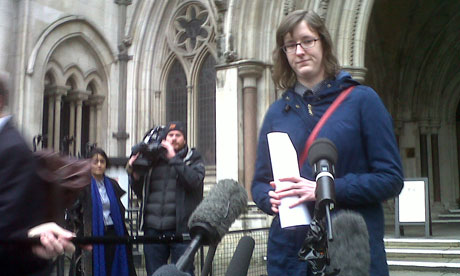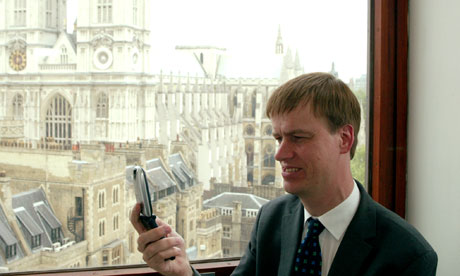It's invaluable that three judges have ruled in the Cait Reilly case against an appalling back-to-work system

Cait Reilly after winning her claim that requiring her to work for free was unlawful. Photograph: Cathy Gordon/PA
Before we get too excited about the judges' ruling in Reilly and Wilson v the secretary of state,
this is not a judgment against slavery or forced labour. Both Cait
Reilly and Jamieson Wilson lodged this appeal on the basis that, in
forcing them to do unpaid work or lose their benefits, the government
was breaching its own regulations.
You may think that there is a moral case to answer for the secretary of state, in pulling someone away from unpaid work in a sector they're interested in, forcing them instead to work unpaid stacking shelves in Poundland, with no training and no advancement of their skills, driving down wages for the rest of Poundland's employees while benefiting nobody but the retailer and the workfare provider. I know that's what I think.
You might think that when you train a skilled engineer to clean furniture – on the basis that the reason for his idleness was that he'd got out of the habit of work, that he needed to prove his mettle with whatever menial task you chose for him – there's a moral case to answer here, too. I'd agree.
But judges Black, Pill and Burnton haven't ruled on morality, they have merely ruled on nuts and bolts: Reilly was told that her scheme was mandatory, where in fact it was not. Wilson was told that if he refused to take part in a six-month work experience programme, he'd lose his benefits for that period. In fact, the maximum sanction would have been a two-week loss of benefits.
Nevertheless, though a ruling on slavery might have added some weight to it, this remains a punch in the face for this government, the Work Programme generally, and workfare in particular. Even the profile of these two cases significantly damages the reputation of this policy, whose raison d'etre is that long-term unemployment is the result of people getting out of the habit of work.
"What are the barriers that people have?" the employment minister Mark Hoban wondered aloud today on World at One. "One of the things people need to demonstrate to an employer is that they can turn up on time." This old chestnut – that long-term unemployment is the preserve of people who can't haul their sorry bones out of bed, must be countered all the time. The more cases we know about of unemployed people who are highly trained, gainfully occupied and routinely insulted by stupid workfare suggestions, the better.
On a practical note, people who've had their jobseeker's allowance stopped on grounds that are similar to Reilly or Wilson's can now claim the money back. This rights a grave social wrong, and delivers a sorely needed sanction to the workfare providers themselves, who understand nothing but money, and might finally question their deficiencies with cash at stake.
But most importantly, there is a growing sense that this back-to-work system is corrupt – my colleague Shiv Malik discovered recently that people on unpaid schemes were being counted as employed to massage the government's figures, even though by any reasonable person's understanding, they were not. Then the BBC revealed that people were being told to declare themselves "self-employed", even when they were simply without work, on the false basis that they could claim more in in-work benefits than JSA – the real benefit, of course, accruing to the Work Programme provider who could then claim them as having been "helped".
All the statistics released about the Work Programme show execrable results, and yet we've heard nothing about penalties, or remaking the contracts, or rethinking the system. There is a creeping sense that this is turning into a cash cow for the private sector, a get-out-clause for the government ("we've spent all this money, if people can't get jobs despite our help, it's because they are inadequate"), and unemployed people will be left at the bottom, ceaselessly harassed by a totally specious narrative in which their laziness beggars a try-hard administration.
A judge, casting doubt on all this in a sober way, is invaluable – three judges, better still. It makes me want to shake the legal profession by its giant hand.
You may think that there is a moral case to answer for the secretary of state, in pulling someone away from unpaid work in a sector they're interested in, forcing them instead to work unpaid stacking shelves in Poundland, with no training and no advancement of their skills, driving down wages for the rest of Poundland's employees while benefiting nobody but the retailer and the workfare provider. I know that's what I think.
You might think that when you train a skilled engineer to clean furniture – on the basis that the reason for his idleness was that he'd got out of the habit of work, that he needed to prove his mettle with whatever menial task you chose for him – there's a moral case to answer here, too. I'd agree.
But judges Black, Pill and Burnton haven't ruled on morality, they have merely ruled on nuts and bolts: Reilly was told that her scheme was mandatory, where in fact it was not. Wilson was told that if he refused to take part in a six-month work experience programme, he'd lose his benefits for that period. In fact, the maximum sanction would have been a two-week loss of benefits.
Nevertheless, though a ruling on slavery might have added some weight to it, this remains a punch in the face for this government, the Work Programme generally, and workfare in particular. Even the profile of these two cases significantly damages the reputation of this policy, whose raison d'etre is that long-term unemployment is the result of people getting out of the habit of work.
"What are the barriers that people have?" the employment minister Mark Hoban wondered aloud today on World at One. "One of the things people need to demonstrate to an employer is that they can turn up on time." This old chestnut – that long-term unemployment is the preserve of people who can't haul their sorry bones out of bed, must be countered all the time. The more cases we know about of unemployed people who are highly trained, gainfully occupied and routinely insulted by stupid workfare suggestions, the better.
On a practical note, people who've had their jobseeker's allowance stopped on grounds that are similar to Reilly or Wilson's can now claim the money back. This rights a grave social wrong, and delivers a sorely needed sanction to the workfare providers themselves, who understand nothing but money, and might finally question their deficiencies with cash at stake.
But most importantly, there is a growing sense that this back-to-work system is corrupt – my colleague Shiv Malik discovered recently that people on unpaid schemes were being counted as employed to massage the government's figures, even though by any reasonable person's understanding, they were not. Then the BBC revealed that people were being told to declare themselves "self-employed", even when they were simply without work, on the false basis that they could claim more in in-work benefits than JSA – the real benefit, of course, accruing to the Work Programme provider who could then claim them as having been "helped".
All the statistics released about the Work Programme show execrable results, and yet we've heard nothing about penalties, or remaking the contracts, or rethinking the system. There is a creeping sense that this is turning into a cash cow for the private sector, a get-out-clause for the government ("we've spent all this money, if people can't get jobs despite our help, it's because they are inadequate"), and unemployed people will be left at the bottom, ceaselessly harassed by a totally specious narrative in which their laziness beggars a try-hard administration.
A judge, casting doubt on all this in a sober way, is invaluable – three judges, better still. It makes me want to shake the legal profession by its giant hand.

